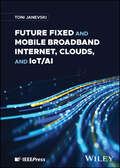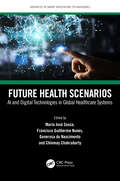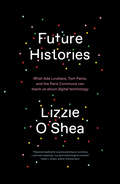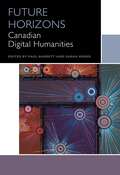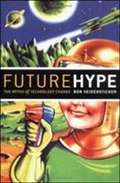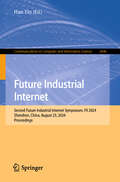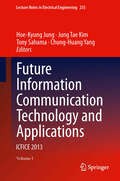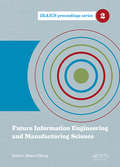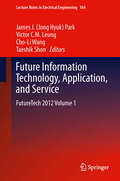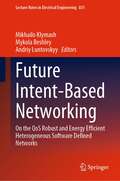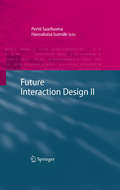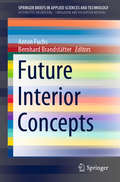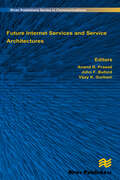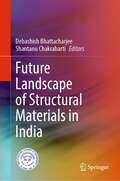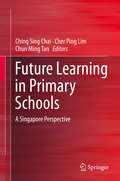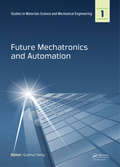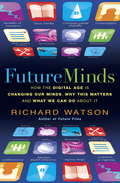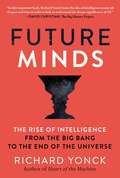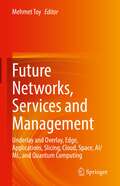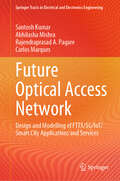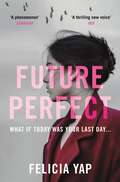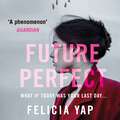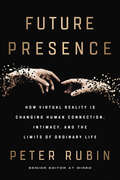- Table View
- List View
Future Fixed and Mobile Broadband Internet, Clouds, and IoT/AI
by Toni JanevskiFUTURE FIXED AND MOBILE BROADBAND INTERNET, CLOUDS, AND IoT/AI All-in-one resource on the development of Internet and telecoms worldwide, based on the technological frameworks as defined by the ITU Future Fixed and Mobile Broadband Internet, Clouds, and IoT/AI is a highly comprehensive resource that provides full coverage of existing and future fixed and mobile broadband networks, internet, and telecom and OTT services. This book explains how to perform technical, business, and regulatory analysis for future 5G-Advanced, 6G, WiFi, and optical access. This book also covers optical transport, submarine cable, future satellite broadband, cloud computing, massive and critical IoT and frameworks and use of AI / ML in telecommunications. Topics covered include: Internet technologies, IPv6, QUIC, DNS, IPX, QoS in Internet/IP, cybersecurity, future Internet 2030, Internet governance Future metallic and optical broadband, carrier-grade Ethernet, SD-WAN, OTN, submarine cable, satellite broadband, business and regulation of broadband Future mobile and wireless broadband, 5G-Advanced, 5G/6G spectrum management, 5G Non-Terrestrial Networks, QoS, 6G/IMT-2030, WiFi 7 (802.11.be), mobile business and regulatory aspects Cloud computing architectures and service models, MLaaS, BaaS, future OTT and telecom cloud services, business and regulation of clouds Future voice, future TV, XR/AR/VR, critical IoT/AI services, future OTT services, metaverse, network neutrality, future digital economy and markets Future Fixed and Mobile Broadband Internet, Clouds, and IoT/AI is an essential reference for government officials and regulators, business leaders, engineers, managers, and employees in the telecommunications industry, ICT business professionals, and students in telecommunications.
Future Health Scenarios: AI and Digital Technologies in Global Healthcare Systems (Advances in Smart Healthcare Technologies)
by Chinmay Chakraborty Maria José Sousa Francisco Guilherme Nunes Generosa Do NascimentoDigital technologies is a major emerging area to invest and research in new models of health management. Future health scenarios are constituted by technologies in health and clinical decision-making systems. This book provides a unique multidisciplinary approach for exploring the potential contribution of AI and digital technologies in enabling global healthcare systems to respond to urgent twenty-first-century challenges. Deep analysis has been made regarding telemedicine using big data, deep learning, robotics, mobile and remote applications. Features: Focuses on prospective scenarios in health to predict possible futures. Addresses the urgent needs of the key population, socio-technical and health themes. Covers health innovative practices as 3D models for surgeries, big data to treat rare diseases, and AI robot for heart treatments. Explores telemedicine using big data, deep learning, robotics, mobile and remote applications. Reviews public health based on predictive analytics and disease trends. This book is aimed at researchers, professionals, and graduate students in computer science, artificial intelligence, decision support, healthcare technology management, biomedical engineering, and robotics.
Future Histories: What Ada Lovelace, Tom Paine, and the Paris Commune Can Teach Us About Digital Technology
by Lizzie O'SheaA highly engaging tour through progressive history in the service of emancipating our digital tomorrow.When we talk about technology we always talk about tomorrow and the future -- which makes it hard to figure out how to even get there. In Future Histories, public interest lawyer and digital specialist Lizzie O'Shea argues that we need to stop looking forward and start looking backwards. Weaving together histories of computing and progressive social movements with modern theories of the mind, society, and self, O'Shea constructs a "usable past" that can help us determine our digital future.What, she asks, can the Paris Commune tell us about earlier experiments in sharing resources--like the Internet--in common? How can Frantz Fanon's theories of anti colonial self-determination help us build digital world in which everyone can participate equally? Can debates over equal digital access be helped by American revolutionary Tom Paine's theories of democratic, economic redistribution? What can indigenous land struggles teach us about stewarding our digital climate? And, how is Elon Musk not a future visionary but a steampunk throwback to Victorian-era technological utopians?In engaging, sparkling prose, O'Shea shows us how very human our understanding of technology is, and how when we draw on the resources of the past, we can see the potential for struggle, for liberation, for art and poetry in our technological present. Future Histories is for all of us--makers, coders, hacktivists, Facebook-users, self-styled Luddites--who find ourselves in a brave new world.
Future Horizons: Canadian Digital Humanities (Canadian Literature Collection)
by Susan Brown Gregory Betts Dean Irvine Sandra Djwa Constance Crompton Katherine McLeod Klara Du Plessis Kiera Obbard Roopika Risam Andrea Zeffiro Deanna Fong M Ryan Fitzpatrick M Eric Schmaltz Dani Spinosa M David Gaertner M Mark V. Campbell M Jon Saklofske Julia Polyck-O’Neill Kim Martin Rashmeet Kaur Pascale Dangoisse Michelle Schwartz Graham H. Jensen M Allan Cho Sarah Zhang Kendra Cowley Asen IvanovAu fil des vingt et quelques chapitres que compte cet ouvrage, les auteurs explorent le passé, le présent et l’avenir de la recherche, de l’enseignement et de l’expérimentation en sciences humaines numériques au Canada. Ce recueil, qui rassemble les travaux de chercheuses et de chercheurs établis et émergents, présente des initiatives contemporaines dans le domaine des sciences humaines numériques. Celles-ci sont conjuguées à un réexamen de l’héritage légué par ce domaine jusqu’à ce jour et à des discussions sur son potentiel. Future Horizons jette aussi un regard historique sur des projets numériques d’envergure, quoique largement méconnus, qui ont été réalisés au Canada. Future Horizons fait plonger le lecteur dans des projets qui mettent à contribution une vaste gamme d’approches — des jeux numériques aux laboratoires ouverts, des archives sonores à la poésie numérique, des arts visuels à l’analyse textuelle numérique — et qui puisent dans des matériaux canadiens tant historiques que contemporains. Dans leurs essais, les auteurs font voir comment une telle diversité d’approches remet en cause la connaissance en permettant aux chercheurs de poser de nouvelles questions.Ce recueil remet en question l’idée selon laquelle il n’existerait qu’une seule définition des sciences humaines numériques ou une seule identité collective nationale. En observant les interactions du numérique avec la race, l’autochtonie, le genre et la sexualité — sans oublier l’histoire, la poésie et le concept de nation —, Future Horizons propose une vue élargie du travail à l’intersection des sciences humaines numériques et des sciences humaines traditionnelles dans le Canada d’aujourd’hui. Ce livre est publié en anglais.Formats disponibles : couverture souple, PDF accessible et ePub accessible.
Future Hype: The Myths of Technology Change
by Bob SeidenstickerConventional wisdom says that technology is the greatest new growth frontier, coupling infinite potential with an ever-growing number of faster, more efficient, and more reliable products and instruments.According to this view, we live in an unprecedented golden age of technological expansion. Not so, according to Future Hype.
Future Industrial Internet: Second Future Industrial Internet Symposium, FII 2024, Shenzhen, China, August 23, 2024, Proceedings (Communications in Computer and Information Science #2446)
by Hao YinThis book constitutes the proceedings of the Second Future Industrial Internet Symposium, FII 2024, held in Shenzhen, China, on August 23, 2024. The 12 full papers and 4 short papers presented in this book were carefully reviewed and selected from 75 submissions.They focus on verious aspects of the latest research, applications and development trends related to the industrial internet and associated fields.
Future Information Communication Technology and Applications: ICFICE 2013
by Chung-Huang Yang Hoe-Kyung Jung Jung Tae Kim Tony SahamaThese proceedings are based on the 2013 International Conference on Future Information & Communication Engineering (ICFICE 2013), which will be held at Shenyang in China from June 24-26, 2013. The conference is open to all over the world, and participation from Asia-Pacific region is particularly encouraged. The focus of this conference is on all technical aspects of electronics, information, and communications ICFICE-13 will provide an opportunity for academic and industry professionals to discuss the latest issues and progress in the area of FICE. In addition, the conference will publish high quality papers which are closely related to the various theories and practical applications in FICE. Furthermore, we expect that the conference and its publications will be a trigger for further related research and technology improvements in this important subject.
Future Information Engineering and Manufacturing Science: Proceedings of the 2014 International Conference on Future Information Engineering and Manufacturing Science (FIEMS 2014), June 26-27, 2014, Beijing, China (IRAICS Proceedings)
by Dawei ZhengThe 2014 International Conference on Future Information Engineering and Manufacturing Science (FIEMS 2014) was held June 26-27 in Beijing, China. The objective of FIEMS 2014 was to provide a platform for researchers, engineers, academics as well as industry professionals from all over the world to present their research results and development acti
Future Information Technology, Application, and Service
by Victor C.M. Leung Taeshik Shon James Jong Park Cho-Li WangThis book is proceedings of the 7th FTRA International Conference on Future Information Technology (FutureTech 2012). The topics of FutureTech 2012 cover the current hot topics satisfying the world-wide ever-changing needs. The FutureTech 2012 is intended to foster the dissemination of state-of-the-art research in all future IT areas, including their models, services, and novel applications associated with their utilization. The FutureTech 2012 will provide an opportunity for academic and industry professionals to discuss the latest issues and progress in this area. In addition, the conference will publish high quality papers which are closely related to the various theories, modeling, and practical applications in many types of future technology. The main scope of FutureTech 2012 is as follows. Hybrid Information Technology Cloud and Cluster Computing Ubiquitous Networks and Wireless Communications Multimedia Convergence Intelligent and Pervasive Applications Security and Trust Computing IT Management and Service Bioinformatics and Bio-Inspired Computing Database and Data Mining Knowledge System and Intelligent Agent Human-centric Computing and Social Networks The FutureTech is a major forum for scientists, engineers, and practitioners throughout the world to present the latest research, results, ideas, developments and applications in all areas of future technologies.
Future Intelligent Vehicular Technologies
by Muhammad Alam Joaquim FerreiraThis book constitutes the refereed proceedings of the First International Conference on Future Intelligent Vehicular Technologies, Future 5V 2016, held in Porto, Portugal, in September 2016. Future 5V presents vehicular networks and communications and also hosted the "Internet of Things (IoT) meets Big Data and Cloud Computing Workshop". The 21 revised full papers presented were reviewed and selected from 38 submissions. The papers cover all aspects of intelligent vehicular communications including security and applications.
Future Intelligent Vehicular Technologies: First International Conference, Future 5V 2016, Porto, Portugal, September 15, 2016, Revised Selected Papers (Lecture Notes of the Institute for Computer Sciences, Social Informatics and Telecommunications Engineering #185)
by Muhammad Alam Joaquim FerreiraThis book constitutes the refereed proceedings of the First International Conference on Future Intelligent Vehicular Technologies, Future 5V 2016, held in Porto, Portugal, in September 2016. Future 5V presents vehicular networks and communications and also hosted the “Internet of Things (IoT) meets Big Data and Cloud Computing Workshop”. The 21 revised full papers presented were reviewed and selected from 38 submissions. The papers cover all aspects of intelligent vehicular communications including security and applications.
Future Intent-Based Networking: On the QoS Robust and Energy Efficient Heterogeneous Software Defined Networks (Lecture Notes in Electrical Engineering #831)
by Andriy Luntovskyy Mikhailo Klymash Mykola BeshleySo-called Intent-Based Networking (IBN) is founded on well-known SDN (Software-Defined Networking) and represents one of the most important emerging network infrastructure opportunities. The IBN is the beginning of a new era in the history of networking, where the network itself translates business intentions into appropriate network configurations for all devices. This minimizes manual effort, provides an additional layer of network monitoring, and provides the ability to perform network analytics and take full advantage of machine learning. The centralized, software-defined solution provides process automation and proactive problem solving as well as centralized management of the network infrastructure. With software-based network management, many operations can be performed automatically using intelligent control algorithms (artificial intelligence and machine learning). As a result, network operation costs, application response times and energy consumption are reduced, network reliability and performance are improved, network security and flexibility are enhanced. This will be a benefit for existing networks as well as evolved LTE-based mobile networks, emerging Internet of Things (IoT), Cloud systems, and soon for the future 5G/6G networks. The future networks will reach a whole new level of self-awareness, self-configuration, self-optimization, self-recovery and self-protection.This volume consists of 28 chapters, based on recent research on IBN.The volume is a collection of the most important research for the future intent-based networking deployment provided by different groups of researchers from Ukraine, Germany, Slovak Republic, Switzerland, South Korea, China, Czech Republic, Poland, Brazil, Belarus and Israel. The authors of the chapters from this collection present in depth extended research results in their scientific fields.The presented contents are highly interesting while still being rather practically oriented and straightforward to understand. Herewith we would like to wish all our readers a lot of inspiration by studying of the volume!
Future Interaction Design II
by Pertti Saariluoma Hannakaisa IsomäkiThe perspectives and techniques used in human-computer interaction design, practice and research are broadening. This book looks at emerging approaches which are likely to contribute to the discipline in near future. The underlying idea is that human character rather than technology should determine the nature of interaction. The concept of "interaction design" covers this range of concerns relevant to enabling quality design. Each chapter emphasizes alternative perspectives on interaction and new concepts to help researchers and practitioners relate to alternative design approaches and opportunities. This second volume provides a wider perspective, from both a scientific and geographic outlook. New topics, such as psychological design processes, gerotechnology, modelling, e-learning and subconscious experiences are discussed from a team of international authors. This book will be of considerable value to those seeking innovative perspectives upon designing and ensuring effective interaction between humans and technology.
Future Interior Concepts (SpringerBriefs in Applied Sciences and Technology)
by Anton Fuchs Bernhard BrandstätterIn this book, the authors highlight multiple aspects of and views on comprehensive automotive interior comfort for future mobility. In this context, passenger comfort comprises thermal, acoustic, seat perception, as well as human–machine interaction in the passenger cabin. In five chapters, the contributing authors, hailing from universities, research centers and industry, share their expertise and insights. They take a closer look at future interior concepts from the standpoints of fundamental and applied research, as well as practical aspects.
Future Internet Services and Service Architectures (River Publishers Series In Communications Ser.)
by Anand R. Prasad John F. Buford Vijay K. GurbaniFuture Internet Services and Service Architectures presents state-of-the-art results in services and service architectures based on designs for the future Internet and related emerging networks. The discussions include technology issues, key services, business models, and security. The work describes important trends and directions. Future Internet Services and Service Architectures is intended to provide readers with a comprehensive reference for the most current developments in the field. It offers broad coverage of important topics with twenty chapters covering both technology and applications written by international experts. The 20 chapters of Future Internet Services and Service Architectures are organized into the following five sections:-• Future Internet Services -- This section contains four chapters which present recent proposals for a new architecture for the Internet, with service delivery in the Future Internet as the key focus.• Peer-to-Peer Services -- Using the P2P network overlay as a service platform, five chapters explore the P2P architecture and its use for streaming services, communication services, and service discovery.• Virtualization -- Virtualization and its benefits for resource management, supporting hetereogeneity, and isolation are the basis for five chapters which describe virtualization at the endpoint, in the cloud, and in the network.• Event-Distribution -- Publish/Subscribe mechanisms are important for applications which require time-sensitive delivery of notifications. The two chapters in this section present recent developments in publish/subscribe load balancing and in sensor networks.• VANETs - Vehicular Ad Hoc Networks (VANETs) are a network technology which are designed for vehicle-to-vehicle and vehicle-to-infrastructure connectivity for moving vehicles. The four chapters in this section provide an introduction to VANETs, routing, services and system architecture.Future Internet Services and Service Architectures is complemented by a separate volume, Advances in Next Generation Services and Service Architectures, which covers emerging services and service architectures, IPTV, context awareness, and security.
Future Landscape of Structural Materials in India
by Shantanu Chakrabarti Debashish BhattacharjeeThis book provides a perspective on the research, development, and manufacturing aspects of structural materials in India. The contents highlight materials to strengthen technology advancements in sectors like aerospace, defense, automotive, energy, health, and ICT.With the momentum of the ‘Make in India’ initiative, India has seen an increase in manufacturing of advanced components for these sectors. The vast field of materials covers a whole gamut including structural materials such as metals like steel, aluminum, titanium, polymers, glass, cement and composites; functional materials such photovoltaics, and smart materials are also discussed.This anthology focuses on structural materials and studies, in particular, the Indian landscape of manufacturing capability, R&D capability and status of advanced structural materials compared to the rest of the world. This study highlights the gaps and suggests necessary actions in the national landscape of structural materials, given the pull that will come from the burgeoning advanced components manufacturing over the next 10-15 years. The scope of this study is limited to structural materials covering metals and alloys, structural polymers, cement, glass, composites and high temperature ceramics. The contents of this book will be useful to researchers, industry professionals, and policy makers alike.
Future Learning in Primary Schools
by Ching Sing Chai Cher Ping Lim Chun Ming TanThis edited book tells the story of the multifaceted efforts devoted by a "future school" in Singapore--The Nan Chiau Primary School--in shaping future learning. It documents the various measures implemented by one primary school to improve student learning outcomes in a technology-rich teaching and learning environment. With the current interest in Singapore's "Masterplan for ICT (information and communication technology) in Education," and the increasing focus on teaching and learning design by leading education researchers and professionals, this well-timed book will appeal to policy makers, educators and researchers.
Future Mechatronics and Automation: Proceedings of the 2014 International Conference on Future Mechatronics and Automation, (ICMA 2014), 7-8 July, 2014, Beijing, China (Studies in Materials Science and Mechanical Engineering)
by GuohuiYangThis proceedings volume contains selected papers presented at the 2014 International Conference on Future Mechatronics and Automation, held in Beijing, China. Contributions cover the latest developments and advances in the field of Mechatronics and Automation.
Future Minds: How the Digital Age Is Changing Our Minds, Why This Matters, and What We Can Do About It
by Richard WatsonDrawing on the latest research, this book looks at the ways that screen culture is shaping the future and changing the way we think. Future Minds asks: are we becoming addicted to data and how do we go about starting a digital diet, urgently? You'll find thought-provoking and practical suggestions about reclaiming the space and time to think deeply.
Future Minds: The Rise of Intelligence from the Big Bang to the End of the Universe
by Richard YonckFor Readers of Michio Kaku and Stephen Hawking, an Epic Journey through the Intelligent Universe With the ongoing advancement of AI and other technologies, our world is becoming increasingly intelligent. From chatbots to innovations in brain-computer interfaces to the possibility of superintelligences leading to the Singularity later this century, our reality is being transformed before our eyes. This is commonly seen as the natural result of progress, but what if there&’s more to it than that? What if intelligence is an inevitability, an underlying property of the universe? In Future Minds, Richard Yonck challenges our assumptions about intelligence—what it is, how it came to exist, its place in the development of life on Earth and possibly throughout the cosmos. Taking a Big History perspective—over the 14 billion years from the Big Bang to the present and beyond—he draws on recent developments in physics and complexity theory to explore the questions: Why do pockets of increased complexity develop, giving rise to life, intelligence, and civilization? How will it grow and change throughout this century, transforming both technology and humanity? As we expand outward from our planet, will we discover other forms of intelligence, or will we conclude we are destined to go it alone? Any way we look at it, the nature of intelligence in the universe is becoming a central concern for humanity. Ours. Theirs. And everything in between.
Future Networks, Services and Management: Underlay and Overlay, Edge, Applications, Slicing, Cloud, Space, AI/ML, and Quantum Computing
by Mehmet ToyThis book describes the networks, applications, services of 2030 and beyond, their management. Novel end-to-end network and services architectures using cloud, wired, wireless, and space technologies to support future applications and services are presented. The book ties key concepts together such as cloud, space networking, network slicing, AI/ML, edge computing, burst switching, and optical computing in achieving end-to-end automated future services. Expected future applications, services, and network and data center architectures to support these applications and services in the year 2030 and beyond, along with security, routing, QoS, and management architecture and capabilities are described. The book is written by recognized global experts in the field from both industry and academia.
Future Optical Access Network: Design and Modelling of FTTX/5G/IoT/Smart City Applications and Services (Springer Tracts in Electrical and Electronics Engineering)
by Santosh Kumar Carlos Marques Abhilasha Mishra Rajendraprasad A. PagareThis book provides detailed information on a low-cost, high-speed infrastructure to support applications and services based on 5G/6G, the Internet of Things (IoT), smart cities, and fiber-to-the-x (FTTX). The contents will serve as a ready reference for researchers, design engineers, network operators, and service providers, as well as graduating engineers interested in pursuing careers in the optical access network domain. The book is a road map for designing and developing access networks for a variety of applications, including smart cities and long-distance high-speed access networks. The book is useful for undergraduate, postgraduate, and research students, particularly in developing South-East Asian countries.
Future Perfect: The Most Exciting High-Concept Novel of the Year
by Felicia YapWhat if today was your last day... A bomb has exploded during a fashion show, killing a beautiful model on the catwalk. The murderer is still at large... and he may strike again. Yet this is the least of Police Commissioner Christian Verger's worries. His fiancée Viola has left him. He has to keep his tumultuous past a secret. To make things worse, his voice assistant Alexa is 99.74% sure he will die tomorrow.Moving from snowy 1980s Montana to chic 1990s Manhattan to a drone-filled 2030s Britain, FUTURE PERFECT is an electrifying race to solve a murder before it's too late. Yet it is also a love story, a riveting portrait of a couple torn apart by secrets, grief and guilt. A twisted tale of how the past can haunt a person's future and be used to predict if he will die... or kill.'Yap is a phenomenon' - Guardian'A clever and multifaceted high-concept story with an engaging murder mystery at its core. Expect this to be one of 2021's biggest thrillers. - Culturefly'A tense and suspenseful race against time...this deftly plotted thriller will make you ruminate about the digital footprints we all leave behind and how they could ultimately define us in a world of ever-advancing technology.' - The Herald (Scotland)
Future Perfect: The Most Exciting High-Concept Novel of the Year
by Felicia YapWhat if the last day you will always remember is today? Emma and Jonathan meet for the first time today, the morning of their twenty-third birthdays. She's gawky and wears hideous orange-and-green socks. He's cute, whimsical and recites obscure poetry. They fall in love. There's a small problem. What happens today, both good and bad, will stay with them for the rest of their lives. From tomorrow onwards, all new memories will be regularly erased by sleep. Today's the last day they will always remember. It gets worse. Emma's housemate Liz has gone missing and her boyfriend, aspiring detective Hans Richardson, has just one day to solve her case... but he doesn't know it.TODAY is a story of seized - and missed - opportunities. It's a tale of love, hope and regret. Can Hans find Liz? Can Emma and Jonathan seize the day, make the right memories to last them a lifetime? Can they work out what love is all about... before it's too late?Felicia Yap brings you the hotly anticipated prequel to YESTERDAY, the high-concept thriller sensation of 2017.'Yap is a phenomenon' - Guardian'A thrilling new voice' - Red'The one that everyone is talking about... Enthralling' - Woman & Home'A blockbuster-worthy twist... YESTERDAY stands out from the crowd' - Stylist'The intrigue of GONE GIRL and the drama of BEFORE I GO TO SLEEP - iNews(P)2018 Headline Publishing Group Ltd
Future Presence: How Virtual Reality Is Changing Human Connection, Intimacy, and the Limits of Ordinary Life
by Peter RubinA Wired senior editor and virtual reality expert presents a captivating, candid glimpse into the future "realities" of this emerging technology: how we will use it to form previously impossible relationships, explore new frontiers of intimacy, and how it will forever change human connection.Heralded as the most significant technological innovation since the smartphone, virtual reality is poised to transform our very notions of life and humanity. Though this tech is still in its infancy, to those on the inside, it is the future. VR will change how we work, how we experience entertainment, how we feel pleasure and other emotions, how we see ourselves, and most importantly, how we relate to each other in the real world. And we will never be the same.Peter Rubin, senior culture editor for Wired and the industry’s go-to authority on the subject, calls it an "intimacy engine." While once we needed another person to feel the sensations of closeness, trust, vulnerability, confidence, and titillation, VR will give us the ability to induce these sensations by ourselves for the first time in human history. This metamorphosis, Rubin argues, is going to have a powerful impact on relationships that will ripple throughout our society and our individual lives.A journey into this uncertain future and a glimpse at the cultural implications and promises of a new reality, Future Presence explores a host of complex questions about what makes us human, what connects us, and what is real. Offering a glimpse into the mind-blowing things happening in universities, labs, and tech companies around the world, Rubin leads readers on an entertaining tour of the weirdest, wildest corners of this fascinating new universe. Describing this book as "half travelogue and half crystal ball", Rubin will:Introduce readers to the creators and consumers of VR technologyShow readers what an experience is like inside the current VR devicesExplain how this technology will upend everything we know about human connection in the futureAt once the incredible, inevitable story of virtual reality’s rise and a look towards the future of our fantasies, Future Presence is a deeply personal examination of what connects us, and an analysis of what relationships, empathy, and sex could look like—sooner than we think.
